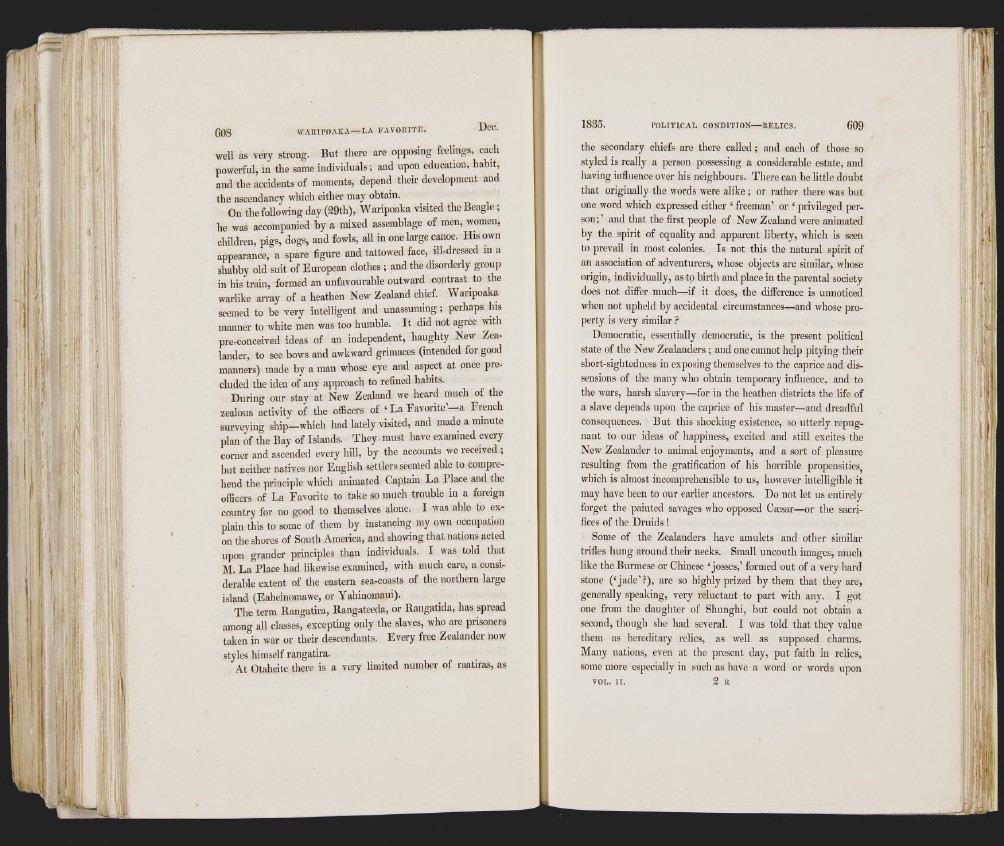
I.• JIfi.
608
Í 's'
ll
«•
.1 Mi,
ll
well as very strong. But there are opposing feelings, eadi
powerful, in the same individuals; and upon education, habit,
and tbe accidents of moments, depend their development and
the ascendancy whicli either may obtain.
On the following day (29th), Waripoaka visited the Beagle ;
be was accompanied by a mixed assemblage of men, women,
children, pigs, dogs, and fowls, all in one large canoe. His own
appearance, a spare figure and tattowed face, ill-dressed in a
shabby old suit of European clothes ; and the disorderly group
in his train, f o r m e d an unfavourable outward contrast to the
warlike array of a heathen New Zealand chief. Waripoaka
seemed to be very intelligent and unassuming ; perhaps his
mnnrier to white lueu was too humble. I t did not agree with
pre-conceived ideas of an independent, haughty New Zealander,
to see bows and awkward grimaces (intended for good
manners) made by a man whose eye and aspect at once precluded
the idea of any approach to refined habits.
During our stay at New Zealand we heard much of the
zealous activity of the officers of ‘ La Favorite’—a French
surveying ship—which had lately visited, and made a minute
plan of the Bay of Islands. They, must have examined every
corner and ascended every hiU, by the accounts we received,
but neither natives nor English settlers seemed able to comprehend
the principle which animated Captain La Place and the
officers of La Favorite to take so much trouble in a foreign
country for no good to themselves alone. I was able to explain
this to some of them by instancing my own occupation
on the shores of South America, and showing that nations acted
upon grander principles than individuals. I was told that
M. La Place had likewise examined, with much care, a considerable
extent of the eastern sea-coasts of the northern large
island (Eaheinomawe, or Yahinomaui).
The term Rangatira, Bangateeda, or Bangatida, has spread
among all classes, excepting only the slaves, who are prisoners
taken in war or their descendants. Every free Zealander now
styles himself rangatira.
At Otaheite there is a very limited number of raatiras, as
the secondary chiefs are there called ; and each of those so
styled is really a person possessing a considerable estate, and
having infiuence over his neighbours. There can be little doubt
that originally the words were alike; or rather there was but
one word which expressed either ‘ freeman’ or ‘ privileged per-
son;’ and that the first people of New Zealand were animated
by the spirit of equality and apparent liberty, which is seen
to prevail in most colonies. Is not this the natural spirit of
an association of adventurers, whose objects are similar, whose
origin, individually, as to birth and place in the parental society
does not differ much—if it does, the difference is unnoticed
when not upheld by accidental circumstances—and whose property
is very similar ?
Democratic, essentially democratic, is the present political
state of the New Zealanders ; and one cannot help pitying their
short-sightedness in exposing themselves to the caprice and dissensions
of the many who obtain temporary influence, and to
the wars, harsh slavery—for in the heathen districts the life of
a slave depends upon the caprice of his master—and dreadful
consequences. But this shocking existence, so utterly repugnant
to our ideas of happiness, excited and still excites the
New Zealander to animal enjoyments, and a sort of pleasure
resulting from the gratification of his horrible propensities,
which is almost incomprehensible to us, however intelligible it
may have been to our earlier ancestors. Do not let us entirely
forget the painted savages who opposed Cassar—or the sacrifices
of the Druids!
Some of the Zealanders have amulets and other similar
trifles hung around their necks. Small uncouth images, much
like the Burmese or Chinese ‘josses,’ formed out of a very hard
stone (‘jade’?), are so highly prized by them that they are,
generally speaking, very reluctant to part with any. I got
one from the daughter of Shunghi, but could not obtain a
second, though she had several. I was told that they value
them as hereditary relics, as well as supposed charms.
Many nations, even at the present day, put faith in relics,
some more especially in such as have a word or words upon
VOL. II. 2 R
f i
I'i
V
it
L !j
!
' .1 r
1